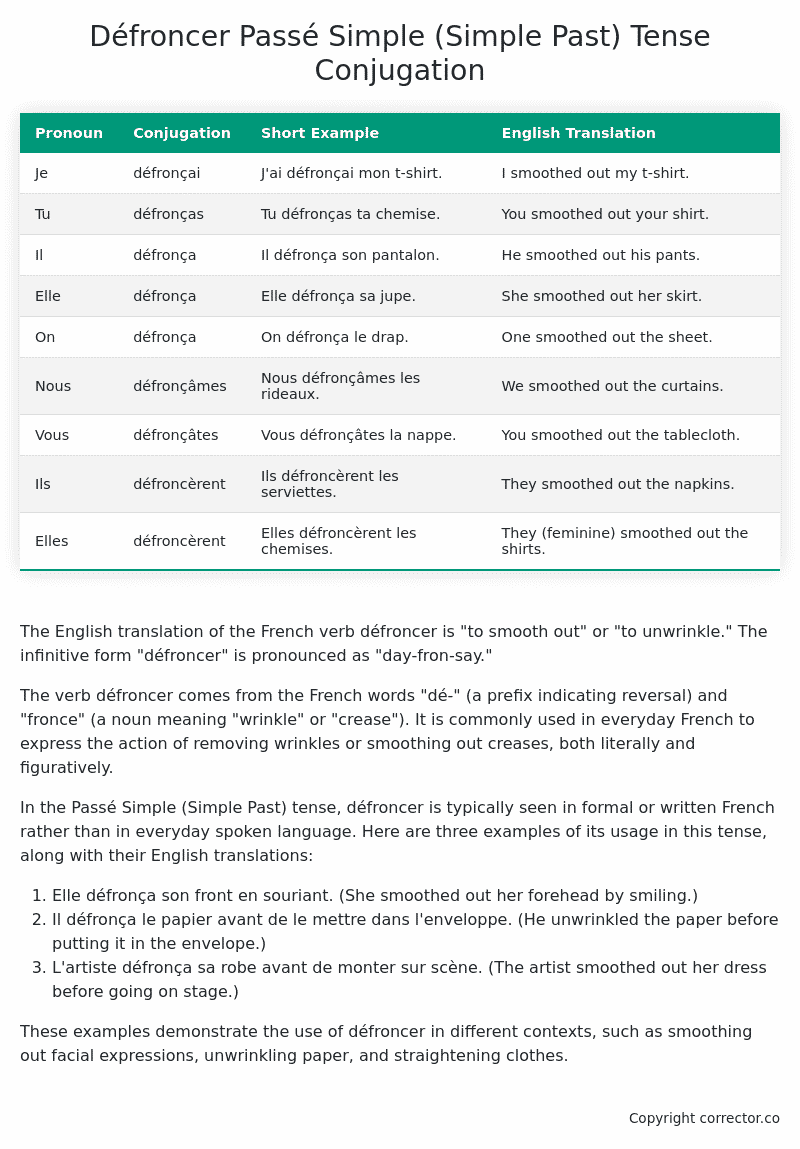Passé Simple (Simple Past) Tense Conjugation of the French Verb défroncer
Introduction to the verb défroncer
The English translation of the French verb défroncer is “to smooth out” or “to unwrinkle.” The infinitive form “défroncer” is pronounced as “day-fron-say.”
The verb défroncer comes from the French words “dé-” (a prefix indicating reversal) and “fronce” (a noun meaning “wrinkle” or “crease”). It is commonly used in everyday French to express the action of removing wrinkles or smoothing out creases, both literally and figuratively.
In the Passé Simple (Simple Past) tense, défroncer is typically seen in formal or written French rather than in everyday spoken language. Here are three examples of its usage in this tense, along with their English translations:
- Elle défronça son front en souriant.
(She smoothed out her forehead by smiling.) - Il défronça le papier avant de le mettre dans l’enveloppe.
(He unwrinkled the paper before putting it in the envelope.) - L’artiste défronça sa robe avant de monter sur scène.
(The artist smoothed out her dress before going on stage.)
These examples demonstrate the use of défroncer in different contexts, such as smoothing out facial expressions, unwrinkling paper, and straightening clothes.
Table of the Passé Simple (Simple Past) Tense Conjugation of défroncer
| Pronoun | Conjugation | Short Example | English Translation |
|---|---|---|---|
| Je | défronçai | J’ai défronçai mon t-shirt. | I smoothed out my t-shirt. |
| Tu | défronças | Tu défronças ta chemise. | You smoothed out your shirt. |
| Il | défronça | Il défronça son pantalon. | He smoothed out his pants. |
| Elle | défronça | Elle défronça sa jupe. | She smoothed out her skirt. |
| On | défronça | On défronça le drap. | One smoothed out the sheet. |
| Nous | défronçâmes | Nous défronçâmes les rideaux. | We smoothed out the curtains. |
| Vous | défronçâtes | Vous défronçâtes la nappe. | You smoothed out the tablecloth. |
| Ils | défroncèrent | Ils défroncèrent les serviettes. | They smoothed out the napkins. |
| Elles | défroncèrent | Elles défroncèrent les chemises. | They (feminine) smoothed out the shirts. |
Other Conjugations for Défroncer.
Le Present (Present Tense) Conjugation of the French Verb défroncer
Imparfait (Imperfect) Tense Conjugation of the French Verb défroncer
Passé Simple (Simple Past) Tense Conjugation of the French Verb défroncer (You’re reading it right now!)
Passé Composé (Present Perfect) Tense Conjugation of the French Verb défroncer
Futur Simple (Simple Future) Tense Conjugation of the French Verb défroncer
Futur Proche (Near Future) Tense Conjugation of the French Verb défroncer
Plus-que-parfait (Pluperfect) Tense Conjugation of the French Verb défroncer
Passé Antérieur (Past Anterior) Tense Conjugation of the French Verb défroncer
Futur Antérieur (Future Anterior) Tense Conjugation of the French Verb défroncer
Subjonctif Présent (Subjunctive Present) Tense Conjugation of the French Verb défroncer
Subjonctif Passé (Subjunctive Past) Tense Conjugation of the French Verb défroncer
Subjonctif Imparfait (Subjunctive Imperfect) Tense Conjugation of the French Verb défroncer
Subjonctif Plus-que-parfait (Subjunctive Pluperfect) Tense Conjugation of the French Verb défroncer
Conditionnel Présent (Conditional Present) Tense Conjugation of the French Verb défroncer
Conditionnel Passé (Conditional Past) Tense Conjugation of the French Verb défroncer
Conditionnel Passé II (Conditional Past II) Tense Conjugation of the French Verb défroncer
L’impératif Présent (Imperative Present) Tense Conjugation of the French Verb défroncer
L’impératif Passé (Imperative Past) Tense Conjugation of the French Verb défroncer
L’infinitif Présent (Infinitive Present) Tense Conjugation of the French Verb défroncer
L’infinitif Passé (Infinitive Past) Tense Conjugation of the French Verb défroncer
Le Participe Présent (Present Participle) Tense Conjugation of the French Verb défroncer
Le Participe Passé (Past Participle) Tense Conjugation of the French Verb défroncer
Struggling with French verbs or the language in general? Why not use our free French Grammar Checker – no registration required!
Get a FREE Download Study Sheet of this Conjugation 🔥
Simply right click the image below, click “save image” and get your free reference for the défroncer Passé Simple tense conjugation!

Défroncer – About the French Passé Simple (Simple Past) Tense
Formation
Usage
Narration
Historical Context
Interactions with other tenses
Passé Composé
Imparfait
Conditional and Subjunctive
Summary
I hope you enjoyed this article on the verb défroncer. Still in a learning mood? Check out another TOTALLY random French verb conjugation!


